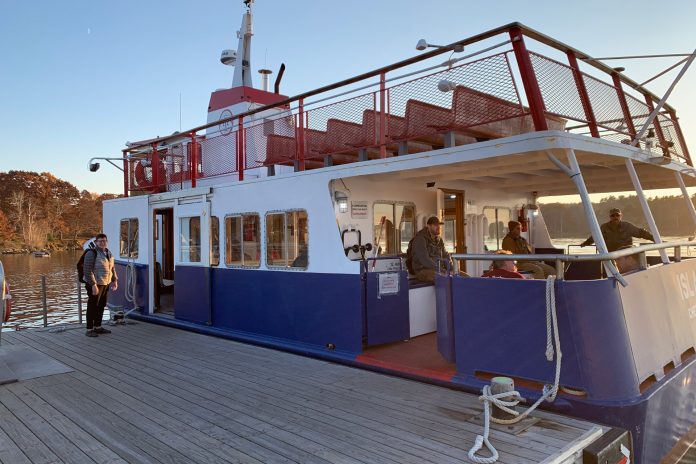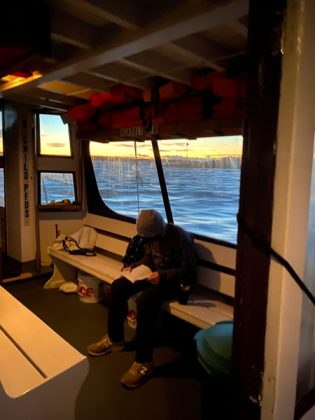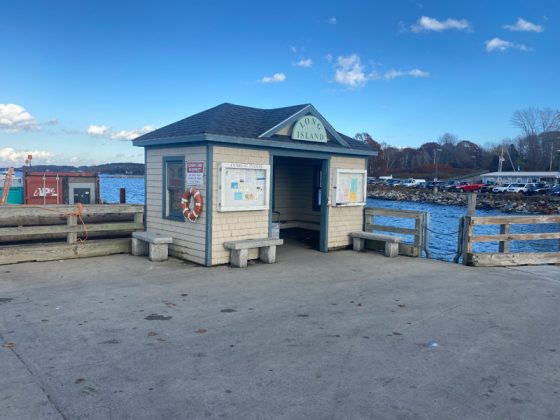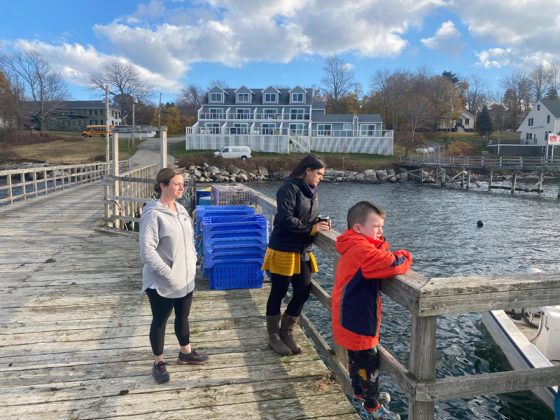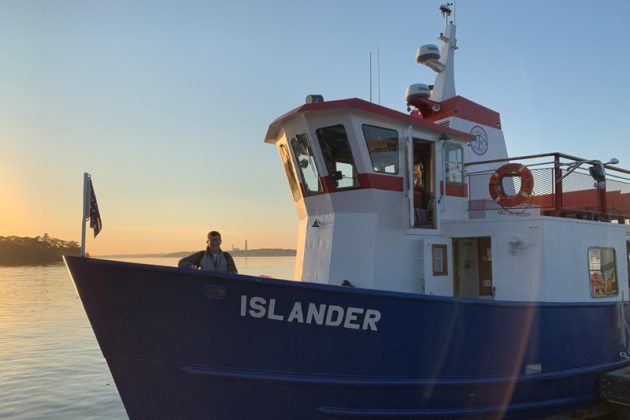Grayson Frothingham is a typical high school freshman. That being the case, the 13-year-old is representative of the breed of students who make their way to and from school amid a unique set of circumstances that the rest of the country can only imagine.
Frothingham’s day begins at about 4:45 a.m. He lays out his clothes and showers. “If I have homework to do, I’ll do it in the morning depending on what time I got home from school the preceding day,” he explained. “I’ll have breakfast and pack my bag.”
He then catches a ride with his mother to the first stop on his commute to school.
His ride is not to catch the traditional yellow school bus but to a pier, where a ferry boat awaits to take him on a 45-minute ride from Big Cranberry Island off the coast of Maine to the mainland. Once there, Frothingham and other students then take a school bus for another hour-long ride to school. At the end of the school day, the process is reversed.
And that, in a nutshell, is the educational lifestyle of students who live on the archipelago of islands around this New England state.
“We like to be on the boat about 15 minutes before it leaves,” Frothingham said. “The bus ride to school takes about an hour. My school days are a bit varied depending on the day. The boat comes from the mainland to Big Cranberry Island, then to Little Cranberry Island and then to school.”
Grayson added the ferry maintains a consistent schedule. “It hasn’t been more than three to five minutes late,” he said. “They have to be [on time] because they are responsible for getting people to school and to work on time.”
Frothingham added that the best part of the ferry trip for him is the morning run to school. “Most of those times I can sleep,” he said. “I enjoy the morning boat because almost every morning, I make coffee and drink it on the boat. it’s peaceful and I can think.”
This is a snapshot of life for students who live in Maine and the group of islands off its New England coast where the North Atlantic Ocean rules and life runs on the schedule of the local ferries. It is a lifestyle that is by choice, including education. And Frothingham and others willingly embrace it.
“I have grown up on the water,” he continued. “There’s a culture on the island. It is a choice.” He and his fellow students are permitted to select their courses and can take classes in person or remotely. He noted that he could have chosen to solely take virtual classes but wanted to attend school in person at least some days. “I go to the Blue Hill Harbor School, but I have some remote classes. Most Mondays I will stay home because I don’t have much on Mondays. You can choose which classes to take. I have one class on Monday, so I remote on Mondays,” he said.
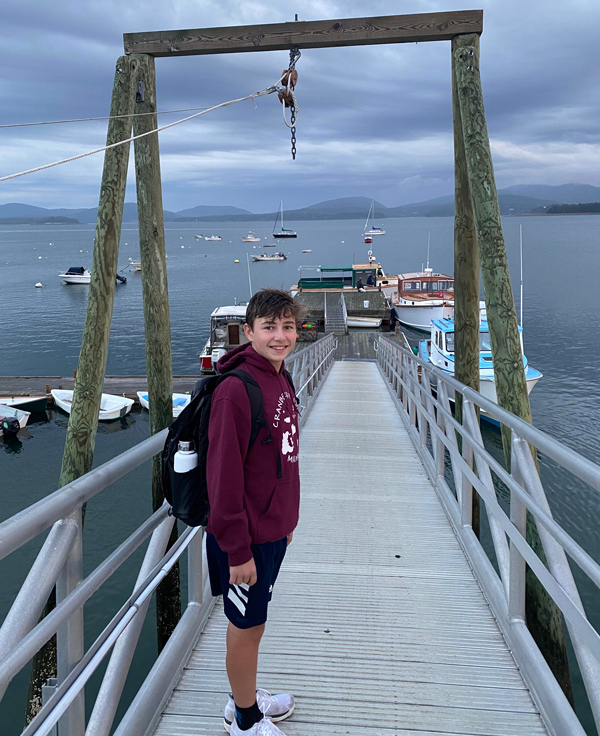
Ferry Land
Ferries are the major mode of travel between the islands and the mainland, and residents are at the mercy of the ferry schedules.
Ferries vary in size from those large enough to carry vehicles to smaller ones limited to passengers. The state owns or contracts with the large ferry companies and other, smaller ones are contracted directly by schools to add runs specifically for students. Elementary students mostly attend school on their respective home islands. While middle schoolers ride the ferry to school, depending on the district, and all high school students take a ferry to another island or the mainland for classes.
Some ferries are shared with adults and education staff going to and from work, some with their vehicles. Construction, crafts and repair workers along with vendors and the materials, vehicles, food supplies, lumber, and other items they take with them are essential to the island lifestyle are all transported by the ferries, the life support of island residents.
“Ferries are a big part of life around here depending on where you live,” commented Katie Truesdale, Frothingham’s mother and the head of school at Blue Hill Harbor School in Blue Hill, Maine. She also rides the ferry to work.
“We do not have a traditional ferry,” Truesdale said. “Others use a state ferry, but ours is a privately owned business, like a lobster boat. These students get on the boat at 6:15 a.m. in the morning and return at 5 p.m. Those are the earliest and latest boat options this time of the year.”
Truesdale said the other option is the commuter boat, which requires students get up at 4:45 a.m. to catch.
She said the boats have traditional names. Truesdale and her son ride the “Miss Lizzie.”
Eric Hann is the operation manager for the 10-school AOS 91 (Alternate Organizational Structure) school district, a consortium of independent school administrations that come together by agreement to share some functions such as transportation. Six of the schools are located on Mount Desert Island while the other four are divided among several other islands, which creates a logistical challenge.
Hann said he is exploring whether there is any state aid available to help purchase a boat for AOS 91 students to prevent them from missing the boat some days for school. He said only high school students ride the ferries. Having their own boat would also eliminate the competition students are in with other uses of the public ferries such as mail deliveries.

“Kids have to be at the docks at a certain time to catch the ferries and if they miss the ferry, they might have to wait a couple hours for the next ferry,” Hann said. “It’s just like a bus, so even when the kids catch the ferry, it does not take them directly to school. [The ferry] may have to go to a location to pick up mail or make a delivery or pick up another person, so you have the issue of kids being on the ferry for a long time. Could be an hour, an hour-and-a-half or anywhere in between.”
Weather and Other Obstacles
Weather can deliver double jeopardy for students who must face adverse road conditions while riding the bus and choppy waters while riding the ferries. “What do you do when you have to decide whether to cancel school because of storm surges?” Hann asked. “We’ve got that. And when roads are slippery, weather is a major factor for us because of snow and ice.
“If we have turbulence on the water some ferries will run, and some won’t,” Hann continued. “Going home if the school bus does not reach the ferry in time, the kids have to wait until the next ferry comes and sometimes if they miss that ferry they will have to stay overnight. I’m not kidding. It doesn’t happen a lot, but it does happen.”
Truesdale agreed, saying a gale wind will stop a ferry. “Already this year I worked remotely for two days because of a gale-force storm. We call them wind days. On wind days we will not commute.”
Frothingham added that he slept in that day but still had to do schoolwork remotely. “It’s a little disappointing that remote learning will be maybe a permanent thing now because on snow days and wind days you still have to work,” he quipped. “That is pretty sad.”
Tides are another obstacle depending on the location of the island. Sometimes technology provides the solution. Ann Kirkpatrick, superintendent of the Chebeague Island School District on South Chebeague Island just off the coast of Yarmouth, Maine, said her staff had to make alternative arrangements last spring because the boat captain knew about the low tide well in advance. “They usually don’t cancel, just change time,” Kirkpatrick said. “But this one time the tide was going to be so low, we worked with the boat company and I worked with [the captain], who said we had to get a boat from Portland that did not sit as deep in the water.”
Kirkpatrick said the captain uses an almanac to predict the low tides and posts the information a month in advance.
“If the tide is way low, and they can’t get through the channel they cancel it,” she said. “They are looking to dredge the route so that doesn’t happen anymore.”
Related: Maine School Bus Fire Likely Caused By Mechanical Issue
Related: Maine School District Delays School Due to Positive COVID-19 Case
Related: Maine Bill Calls for Increased Funding of Electric School Buses
Related: Maine Student Hit at School Bus Crossing, Flashing Lights Not Activated
Related: Nor’easter Storm Closes Maine Schools, Strands Students
Discipline and Safety
While safety precautions are standard and students receive no preferential treatment, discipline is strict and maintained by a monitor in the person of a deckhand.
“Once the kids are on the school bus, they are our responsibility,” Kirkpatrick explained. “Once they are on the boat, they are the responsibility of the boat captain and crew. For that reason, the captain and the deckhand are pretty strict with the kids, and the kids know how to behave on the boat because they ride boats on a daily basis.”
She said students are not required to wear life jackets, and everybody knows where they are stored. All passengers are required to wear face masks when sitting in the boat’s cabin, but not outside on deck. Kirkpatrick noted that because Chebeague contracts directly with a private company, their students get priority when boarding the boat and when disembarking.
Editor’s Note — Original photo captions inadvertently misidentified Ann Kirkpatrick waiting to board and riding a ferry.



